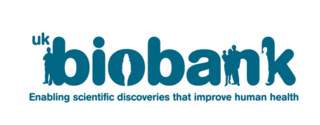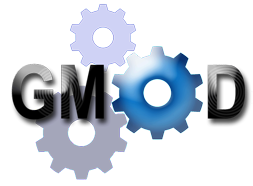The International HapMap Project was an organization that aimed to develop a haplotype map (HapMap) of the human genome, to describe the common patterns of human genetic variation. HapMap is used to find genetic variants affecting health, disease and responses to drugs and environmental factors. The information produced by the project is made freely available for research.

UK Biobank is a large long-term biobank study in the United Kingdom (UK) which is investigating the respective contributions of genetic predisposition and environmental exposure to the development of disease. It began in 2006.

Ensembl genome database project is a joint scientific project between the European Bioinformatics Institute and the Wellcome Trust Sanger Institute, which was launched in 1999 in response to the imminent completion of the Human Genome Project. Ensembl aims to provide a centralized resource for geneticists, molecular biologists and other researchers studying the genomes of our own species and other vertebrates and model organisms. Ensembl is one of several well known genome browsers for the retrieval of genomic information.
Bioconductor is a free, open source and open development software project for the analysis and comprehension of genomic data generated by wet lab experiments in molecular biology.

The Generic Model Organism Database (GMOD) project provides biological research communities with a toolkit of open-source software components for visualizing, annotating, managing, and storing biological data. The GMOD project is funded by the United States National Institutes of Health, National Science Foundation and the USDA Agricultural Research Service.

Genetic Alliance is a nonprofit organization, founded in 1986 by Joan O. Weiss, working with Victor A. McKusick, to advocate for health benefits in the accelerating field of genomic research. This organization is a network of over 1,000 disease advocacy organizations, universities, government organizations, private companies, and public policy organizations. They aim to advance genetic research agendas toward health benefit by engaging a broad range of stakeholders, including healthcare providers, researchers, industry professionals, public policy leaders, as well as individuals, families and communities. They create programs using a collaborative approach, and aim to increase efficiency and reduce obstacles in genetic research, while ensuring that voices from the involved disease communities are heard. They also promote public policies to advance healthcare. Genetic Alliance provides technical support and informational resources to guide disease-specific advocacy organizations in being their own research advocates. They also maintain a biobank as a central storage facility for several organizations who otherwise would not have the infrastructure to maintain their own repository.
Public health genomics is the use of genomics information to benefit public health. This is visualized as more effective preventive care and disease treatments with better specificity, tailored to the genetic makeup of each patient. According to the Centers for Disease Control and Prevention (U.S.), Public Health genomics is an emerging field of study that assesses the impact of genes and their interaction with behavior, diet and the environment on the population's health.

A biobank is a type of biorepository that stores biological samples for use in research. Biobanks have become an important resource in medical research, supporting many types of contemporary research like genomics and personalized medicine.
The Genome-based Research and Population Health International Network (GRaPH-Int) is an international collaboration of experts and researchers focused in the area of population health. The principal goal of the network is to promote the translation of genome-based science and technology into improvements in population health.
The Centre for Applied Genomics is a genome centre in the Research Institute of The Hospital for Sick Children, and is affiliated with the University of Toronto. TCAG also operates as a Science and Technology Innovation Centre of Genome Canada, with an emphasis on next-generation sequencing (NGS) and bioinformatics support. Research at TCAG focuses on the genetic and genomic basis of human variability, health and disease, including research on the genetics of autism spectrum disorder and structural variation of the human genome. The centre is located in the Peter Gilgan Centre for Research and Learning in downtown Toronto, Canada.
Sir John Irving Bell is a Canadian immunologist and geneticist. From 2006 to 2011, he was President of the Academy of Medical Sciences, and since 2002 has held the Regius Chair of Medicine at the University of Oxford, UK. He has been Chairman of OSCHR since 2006.
Biobank ethics refers to the ethics pertaining to all aspects of biobanks. The issues examined in the field of biobank ethics are special cases of clinical research ethics.
Privacy for research participants is a concept in research ethics which states that a person in human subject research has a right to privacy when participating in research. Some typical scenarios this would apply to include, or example, a surveyor doing social research conducts an interview with a participant, or a researcher for a clinical trial asks for a blood sample from a participant to see if there is a relationship between something which can be measured in blood and a person's health. In both cases, the ideal outcome is that any participant can join the study and neither the researcher nor the study design nor the publication of the study results would ever identify any participant in the study.
Translational bioinformatics (TBI) is an emerging field in the study of health informatics, focused on the convergence of molecular bioinformatics, biostatistics, statistical genetics and clinical informatics. Its focus is on applying informatics methodology to the increasing amount of biomedical and genomic data to formulate knowledge and medical tools, which can be utilized by scientists, clinicians, and patients. Furthermore, it involves applying biomedical research to improve human health through the use of computer-based information system. TBI employs data mining and analyzing biomedical informatics in order to generate clinical knowledge for application. Clinical knowledge includes finding similarities in patient populations, interpreting biological information to suggest therapy treatments and predict health outcomes.
The genomic epidemiological database for global identification of microorganisms or global microbial identifier (GMI) is a platform for storing whole genome sequencing (WGS) data of microorganisms, for the identification of relevant genes and for the comparison of genomes to detect and track-and-trace infectious disease outbreaks and emerging pathogens. The database holds two types of information: 1) genomic information of microorganisms, linked to, 2) metadata of those microorganism such as epidemiological details. The database includes all genera of microorganisms: bacteria, viruses, parasites and fungi.
CARTaGENE is a population based cohort based on an ongoing and long-term health study of 40, 000 men and women in Québec. It is a regional cohort member of the Canadian Partnership for Tomorrow Project. The project's core mandate is to identify the genetic and environmental causes of common chronic diseases affecting the Québec population. The overall objective from a public health perspective is to develop personalized medicine and public policy initiatives targeting high-risk groups. CARTaGENE is under the scientific direction of Sébastien Jacquemont, M.D., Ekaterini Kritikou, Ph.D. and Philippe Broët, M.D. Ph.D., of the Sainte-Justine Children's Hospital University Health Center. Based in Montréal Québec, Canada, CARTaGENE is operated under the infrastructure of the Sainte-Justine Children's Hospital University Health Center and has seen funding from Genome Canada, the Canadian Foundation for Innovation and Génome Québec and the Canadian Partnership Against Cancer (CPAC) since 2007 among other sources. The program was initially founded by Professors Claude Laberge and Bartha Knoppers, and developed through two phases of participant recruitment under the direction of Professor Philip Awadalla as Scientific Director of the cohort from 2009 to 2015, who is now the National Scientific Director of the Canadian Partnership for Tomorrow Project (CPTP).
The acronyms ELSI and ELSA refer to research activities that anticipate and address ethical, legal and social implications (ELSI) or aspects (ELSA) of emerging sciences, notably genomics and nanotechnology. ELSI was conceived in 1988 when James Watson, at the press conference announcing his appointment as director of the Human Genome Project (HGP), suddenly and somewhat unexpectedly declared that the ethical and social implications of genomics warranted a special effort and should be directly funded by the National Institutes of Health.
Dynamic consent is a new approach to consent that engages individuals in decisions about how their personal information should be used. It is a personalised, digital communication interface that enables two-way communication between participants and researchers, and puts participants at the centre of decision making. It is a practical example of how software can be developed to give research participants control over how their data is used.
DNA encryption is the process of hiding or perplexing genetic information by a computational method in order to improve genetic privacy in DNA sequencing processes. The human genome is complex and long, but it is very possible to interpret important, and identifying, information from smaller variabilities, rather than reading the entire genome. A whole human genome is a string of 3.2 billion base paired nucleotides - the building blocks of life -, but between individuals, the genetic variation differs only by 0.5%, an important 0.5% that accounts for all of human diversity, the pathology of different diseases, and ancestral story. Emerging strategies incorporate different methods, such as randomization algorithms and cryptographic approaches, to de-identify the genetic sequence from the individual, and fundamentally, isolate only the necessary information while protecting the rest of the genome from unnecessary inquiry. The priority now is to ascertain which methods are robust, and how policy should ensure the ongoing protection of genetic privacy.





